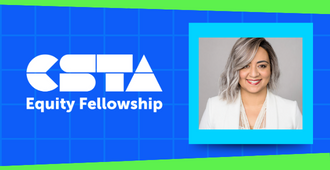Sofía De Jesús is the author of Applied Computational Thinking with Python and the associate program manager and Spanish outreach lead for Carnegie Mellon University’s Computer Science Academy. She has over 20 years of education experience, including time in the classroom, curriculum design, and providing professional development to other educators. Sofía received her master’s degree in teacher education, and she has completed all coursework for her EdD. She has presented at multiple national and international conferences on equitable CS education, accessibility, and equitable assessment practices.
Sofía’s career demonstrates her firm and longstanding commitment to removing barriers to CS access. She scrutinizes CMU CS Academy content to ensure that it meets technical accessibility standards, so that students at different ability levels can use the content easily. Because CMS CS Academy often works with districts where Black, Latine, and other historically underrepresented students comprise a majority, it’s also crucial that the curricula, materials, training, and ongoing support are provided free of cost. “Part of my job is to find ways to ensure that we can continue this work,” says Sofía, “as keeping the work free is critical to our mission and a point we are not willing to compromise on.”
But access extends far beyond these technical and financial aspects. As the Spanish language lead for CMU CS Academy, Sofía’s responsibilities include overseeing the translation of their content into Spanish, managing the CS Academy’s team of bilingual and multilingual undergraduate students, and assisting with accessibility audits.
Sofía is a particularly strong advocate for building accessibility into CS education requirements. “We cannot begin the journey by requiring CS in schools while making exceptions to the requirement” for disabled students and others from marginalized groups, says Sofía. Instead, the CS curriculum must be provided consistently to everyone, a goal that requires the involvement and voices of neurodivergent, disabled, multilingual, Latine, Black, and Native students from the very beginning. When curriculum is presented the same way every time, without consideration of individual needs, it will inevitably leave some students behind. Sofía says, “Now I focus on ensuring that all students can think ‘it works for them,’ by designing a curriculum that actually takes them into account as individuals, providing tools that allow them to be successful.”
In addition to the work of keeping CMU CS Academy content inclusive, Sofía works hard to stay abreast of developing research and accessibility efforts. CMU CS Academy employs culturally relevant pedagogy and the Kapor Center’s Framework for Culturally Responsive-Sustaining CS Education; and it is constantly revising and reassessing existing content based on feedback from teachers, students, undergrads, and other stakeholders. Sofía is a member of the National Advocacy Coalition, as well as a member of CS for Access, where she helps lead the subcommittee for developers and providers. “The nature of this work is collaborative and should not be done in silos,” Sofía says. “The more we learn from each other, the more we can push for changes in accessibility of CS education.”
Sofía believes that learning from one’s peers is a vital piece of the equity puzzle. She prioritizes collaboration with those who are at the forefront of equity work, presenting at numerous conferences and traveling across the country to work with people who are as committed as she to making CS education fair and accessible. “In order for me to better understand and support this critical work, I can’t just be doing it on my own,” she says.
Citing her belief that “collaboration is key to growth,” Sofía is excited to work with her cohort of CSTA Equity Fellows to continue expanding her knowledge base. With one foot in academia and one in K–12 education, she has often noticed a massive disconnect between the two, in which the voices of academics are allowed to drown out the stories and experiences of those who are actually doing the work on the ground. “I like to participate in groups that connect teachers, district leaders, developers, and academics,” Sofía says, “so that work can be cohesive, cutting-edge, and meaningful.” She believes the CSTA Equity Fellowship will provide just such an opportunity.
As someone who always jumps at the chance to hear from teachers directly, Sofía particularly hopes to learn from her cohort about student populations she’s had less experience with, such as Native and rural students. She wants to ask the important questions: “How do we best support these students? Where am I lacking in my knowledge and understanding?” By learning directly from teachers about their needs, Sofía can bring that information to her work and ensure that teachers and students are getting necessary, appropriate, and targeted support and resources.Over her years as an educator, Sofía is happy to say, “I have shifted my mentality from ‘it’s not my job to fix this’ to ‘how can I help this change happen?’” She knows that the CSTA Equity Fellowship will help her to make those changes happen.

